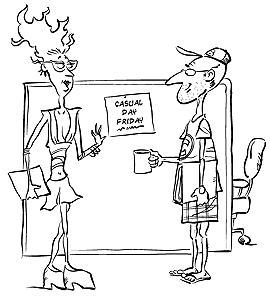
Most law firms of any size these days have a website. Basic websites are easy and inexpensive to set up, and the potential exposure for firms is enormous. (Check out my related post on the merits of blogging as business development.)
One problem with firm websites, of course, is that they are replete with spin. Every firm does "cutting edge" work, has a "strong" stable of clients, and boasts lawyers who are "leading experts" in their fields. OK, fine. You don't need me to help filter this spin. Everyone knows there are a lot of worker bees out there engaged in monotonous drudgery.
No, what I want to focus on is what information is NOT on firm websites. Take a look at a few blue chip firm websites in New York, or Chicago, or D.C., or elsewhere. (I don't want to pick on particular firms, so it's up to you to choose what firms to examine.) What do you notice--in addition to the spin, that is? Here's the answer: many firms do not list detailed information about their associates! Firm sites brag on and on about their partners' areas of expertise, client bases, and publications--but for associates you often only see a name, phone number and e-mail address.
Why would this be? Are firms not proud of their associates? No, they are proud (and if not, they "encourage" associates to leave). Do they think associates cannot engage in business development, so that it is not necessary to tout them to the world? Again, the answer is "no." Associates bring in large and small clients all the time.
So what's going on?
What's going on is that firms are playing "hide the ball." Or rather, "hide the associate." Firms often try to keep information about their associates from other firms and headhunters (legal recruiters), to make it harder for their associates to be poached by other firms. And make no mistake: poaching is the name of the game at big firms. Salaries for junior associates are so high these days that most associates generate a loss until their third year of practice. So it is more cost-effective to let someone else train the junior associate newby (and take the loss) and then poach them away.
Here's the irony. This system does not work. Everyone is playing this game. So while a firm might keep information about its associates off the web, it is also harder for that firm to find out about attractive potential hires from other firms. It would seem far more efficient (and moral) for firms to treat associates better as a way to disincentize them from leaving. But no. It is easier (albeit sillier) to simply block others from seeing what your associates do.
I have seen this happen: one day a firm website contains associate biographical information, and the next day it is gone. One explanation I have heard is that associates are not partners, and only partner information should be posted. This is specious, in my view. If you have an equity stake in a firm as partner, wouldn't you want to maximize the firm's potential by promoting your greatest assets--namely, all your lawyers? (Hint: that is a rhetorical question.)
The truly ironic part is that instead of preventing people from leaving practice, this approach gives associates one less reason to stay. I myself am off the firm treadmill and happily employed as a law professor. And my school does not hesitate to post my information online, even though I do not yet have tenure. To do otherwise would make no sense.








